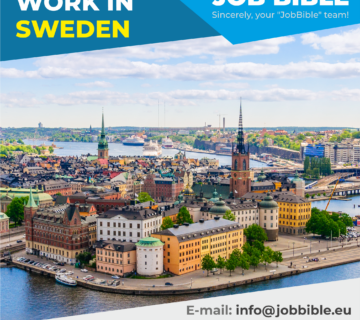There are three main statuses that allow you to stay in Sweden for a long time. It:
- temporary residence permit;
- permanent residence permit;
- citizenship.
The time, that a migrant spends in Sweden, depends on the reason for his move to Sweden and how his migration history will develop in the country. If you get Swedish citizenship, it remains with you throughout your life. Of course, if you are just going to move to Sweden for a long time, for example, for the purpose of work, you can get only a temporary residence permit – the main thing is that you have a legal basis for staying in the country.
So for moving in Sweden you can use three steps:
- Find a job, get a work permit and move based on it;
- Reunite with next of kin (did a romantic relationship with a Swede or a Swede develop into a civil or official marriage, this is a legal reason to apply for a residence permit);
- Come to study. The fact of long-term study in Sweden does not give the right to stay in the country after graduation. However, if during this time the student finds a permanent job, starts a family (or enters into a civil marriage), he can use one of the two steps above;
If you want to get asylum: all issues related to obtaining asylum are dealt with by the Migration Service. The Swedish migration authorities assess the possibility of obtaining refugee status for citizens of the Russian Federation and the countries of Eastern Europe and Central Asia, where people speak in Russian, as extremely low.
If you want to move for work, so you need to find a job in Sweden – first find, then move, in that order. The main player in the work and residence permit process is your Swedish employer. The employer must comply with a number of standard conditions: the position must be publicly announced, according to Swedish rules; your salary must meet the established minimum, you must be insured and pay contributions to the pension fund from your salary.
It is important to work for at least two years with the employer who gave you your first job in Sweden in the same occupation. The first, temporary residence permit is “attached” to a specific specialty and a specific employer. It is impossible to keep a residence permit if, for example, you did not like your first job in Sweden; will have to start all over again. The ideal scenario is to work with the first employer for four years. In this case, if the employer complied with all the conditions of employment legislation, the employee receives a permanent residence permit in Sweden. If, after two years, the first employer still needs to change jobs, this is not interfering with obtaining a permanent residence permit.
The Swedish migration authorities are well aware that finding a job can take a lot of time, so it is enough for an applicant for a permanent residence permit to complete these required four years in total – within seven years from the date of arrival in Sweden.
It doesn’t matter what level of education you have to the immigration authorities. At the same time, the Swedish system requires recruitment transparency. In order to employ a foreign citizen, for example, as a programmer, a Swedish employer must first announce the position in the prescribed manner and consider all applications received. An employer does not have the right to offer a salary lower than the standard established in the industry – for a resident of Sweden or a moving migrant worker, it must be the same. Equally strict requirements apply to the insurance of an employee already living in Sweden or intending to move. These principles are monitored, for example, by trade unions. As a result, the employer should be able to motivate why this particular foreign candidate has the absolute best competencies for the position of a programmer.
But the prevailing opinion that the Swedish employer is obliged to prioritize candidates for a position from Sweden and the EU is wrong. The task of the employer is to create equal conditions for all potentially interested candidates by disseminating information about the position within the EU. In some industries, the employer’s ability to provide a migrant worker with proper conditions is checked especially closely.
The employer is the guarantor before the state of the legality of your employment and, accordingly, moving to Sweden. In order to accept an employee in Sweden and provide him with decent working conditions, the employer must carry out personnel work and fulfill a number of conditions. In other words, the employer must be seriously interested in you: this is the main and indispensable prerequisite for a successful move to Sweden for work.
If you have a short stay Schengen visa, you can stay in Sweden and look for a job too. Firstly, job search does not require a mandatory presence on the spot in and, secondly, it is often a lengthy procedure that exceeds the validity period of a short-term visa. When your candidacy is approved by the employer, you will usually need to apply for a work permit and wait for it to be received in your country. Even the longest multi-visa, designed for short visits, in order to be in Sweden as an employee, will not work
A special situation is with professions officially included in the so-called List of professions in short supply. These include, for example, a concrete worker, a sandblaster, an electrician, a welder mma 111, a welder tig 141, a welder mig/mag 135/136 etc. – in some cases, the employer can start the procedure for obtaining a work permit for such a specialist directly in Sweden. An extremely important detail is related to the need to confirm profile education (legitimization) by the relevant Swedish authorities. This means that Sweden really needs, for example, a welder, but confirming the compliance of a foreign welder education with Swedish is a separate and slow process.




